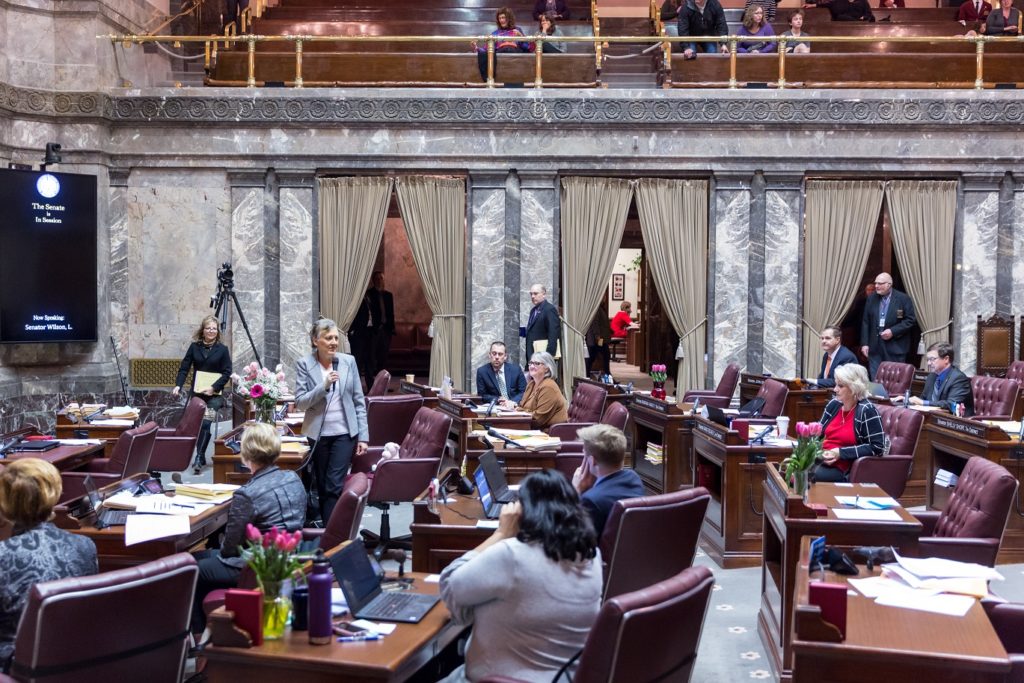Hello, Friends and Neighbors!
When one political party controls both houses of the Legislature, a legislative session should end on schedule. That’s because partisan disagreements can’t get in the way and force what is formally known as an “extraordinary” session. Yet in 2010 and 2011, one party had majorities in the Senate and House and still needed 30 additional days in each of those years to wrap things up.
With a little more than two weeks to go in our 2019 session, there is reason to wonder whether it too will conclude on time. The majorities in the Senate and House are very far apart on how much to spend in the new state operating budget, and how to pay for it all.
One thing seems for sure, unfortunately: tax increases are coming, even though state government already has more than enough revenue to continue services and programs at their current levels and invest more in special education, mental-health treatment and other pressing needs.
Today the Senate is in session because we’re in the middle of the 8-day stretch reserved for full Senate votes on bills that were adopted by the House and have also made their way through the Senate committee process. After Wednesday, our time will be almost exclusively focused on two things: debating and voting on budget-related legislation, and what are called “concurrences.” That’s when we look at how the House has changed bills passed by the Senate, and decide whether to agree or make what amounts to a counterproposal.

‘Tax Day’ offers glimpse of Senate majority’s direction
Late last week the Senate majority approved its 2019-21 budget. This happened several days after the House passed its budget. Now negotiators from the two chambers are working to reach a compromise – a process that in past years has taken days, weeks or months. In both cases, the budgets are just the spending plans, as neither the Senate nor the House has approved the tax bills needed to balance their proposals.
On Monday, the $1.3 billion worth of tax bills associated with the Senate budget came before our Senate budget committee for public hearings. They are:
- SB 5998 – The state puts a flat 1.28% excise tax on real-estate transactions. This bill would turn that into a graduated tax, meaning it would vary based on selling price.
- 0.75% if the selling price is less than $250,000;
- 1.28% (no change) if the selling price is between $250,000 and $1 million;
- 2% if the selling price is between $1 million and $5 million;
- 2.5% (almost double) if the selling price is $5 million or more.
- SB 5996 – This would increase the tax on property/casualty insurance (for the first time since 1891!) to pay for fire prevention and suppression activities that are now paid out of the general fund or the disaster response account. That means yours!
- SB 5997 – This would radically change the non-resident sales tax exemption, converting it to a remittance program that offers refunds (when at least $25 in tax was paid) and only for the immediately preceding calendar year. It also would do away with the lower tax rate for travel agents and tour operators.
The non-resident sales-tax exemption has been targeted before, meaning lawmakers from border counties like me have to explain the harm it would do to our local retailers.
During the hearing on SB 5997 this week, the chair of the Ways and Means committee wondered aloud whether Oregonians who relocate to our state might be hanging on to their ID, illegally, to continue taking advantage of the non-resident tax exemption. The answer is yes – that’s one of the reasons for SB 5362, my bill to address the pervasive problem of vehicle-license (and driver’s license) fraud in our state. The committee chair was not aware of my bill, but now all the committee members have been reminded.
Although SB 5362 stalled in the House, I’m hopeful that the language can be added to another piece of legislation and still become law this year. And that the Legislature will avoid taking action that hurts retailers in border counties like ours.
New income tax, stealth gas-tax increase still on the table
Washington doesn’t have a state income tax. To me that makes our state more attractive to prospective employers. However, certain interest groups like to claim the lack of an income tax makes Washington’s tax system “upside down.” They repeated that accusation often when our budget committee held a hearing early this week on SB 5961, the Senate Democrat version of a capital-gains income tax.
The Senate budget, unlike the House budget, doesn’t rely on imposing a tax on capital-gains income. However, there is no guarantee that the Senate won’t give in during the budget negotiations with the House. To me a tax on capital-gains income is a gateway to a full-blown income tax, because as time goes on, the number of people subject to the tax is likely to grow.
I’m also watching SB 5993 very closely. This bill came before our budget committee in late March. It would change the state’s hazardous-substances tax, which now fluctuates based on oil prices, to a tax per barrel of oil. That’s sure to cause a rise in the pump price of a gallon of gas. The hazardous-substances tax was created by voters long ago, and is supposed to fund environmental cleanup projects, but all too often the money is swept from the account and used for random purposes.
My bills: ‘Blaze Pink’ unanimously passed by Legislature
I’m happy to report that on Wednesday night the House unanimously approved my SB 5148, to let hunters choose blaze pink safety clothing along with the long-required fluorescent orange. The bill passed the Senate unanimously in February. It will automatically become law unless the governor vetoes it (and he’s out of state pursuing a new job, so I don’t foresee that happening).
SB 5151, my bill to require a “rational system” for the filing and indexing of decisions and orders from the state’s Growth Management Hearings Board, was moved to the House voting calendar Wednesday. I am optimistic that it will become my second bill to move all the way through the lawmaking process this year.
I mentioned how there still may be an opportunity to address the issue of vehicle- and driver’s-license fraud, which is the point of SB 5362. I am hoping a similar opportunity presents itself concerning my Mental Health for Heroes Act (SB 5428), because the House budget committee has blocked it for a third straight year. That’s frustrating, considering the cost can’t be an issue. But it is not the only Senate bill to fail in the House budget committee this year despite solid bipartisan sponsorship, and a unanimous vote of support from the Senate. You wonder what the sticking point is.
How firearm bills could affect the safety of women
Imagine the police are called to a home and find a woman who has been beaten up by someone – a spouse, a partner, maybe a family member. It’s a clear case of domestic violence, so the police arrest the suspect. The victim legally owns a firearm; however, the police seize it, and any other firearms and ammunition, for a five-day “cooling off” period.
The suspect is freed from custody within a day or two and returns, armed – with a bat, a knife, maybe a firearm – to confront the victim, who is now without a firearm that could give her an even chance to defend herself. Is that likely to end well for the woman?
Wait, you say – why would the police seize firearms and ammunition for five days? Because on Thursday, the Senate majority approved House Bill 1225, which would require that seizure.
It’s as though the majority assumed any firearm left in the household could only be used against the victim (usually a woman), and never considered that the victim (again, usually a woman) might be proficient in the use of a firearm and could use the firearm to keep from being victimized again.
Furthermore, the seizure of all firearms over the wishes of the victim may be exactly what the suspected abuser wants – knowing the victim could be left defenseless, which opens the door to more abuse, or something worse.
The bill was changed in the Senate and has to go back to the House, but look for some version of it to become law.
I also expect the Senate majority to pass House Bill 1465, which would essentially ignore the fact that the holder of a concealed pistol license (CPL) has already undergone an extensive background check. If the bill passes, CPL holders would have to go through a check – and a waiting period – for each purchase of a handgun or semiautomatic firearm, just like anyone else.
There are 600,000 CPL holders in our state, myself included. State law allows us to go to a dealer, buy a handgun and walk out with it. If the concern is that CPLs can be forged, or can’t easily be verified, changing the law isn’t the solution. Especially when the bill includes an “emergency clause” that prevents citizens from overturning it (through a voter referendum) at the next general election.
For a woman whose firearm is seized because of a domestic-violence incident (if HB 1225 becomes law), this bill makes things worse. It wouldn’t matter if she holds a CPL, she can’t leave the firearm dealer with a replacement handgun that could end up saving her life.
My colleagues in the Democrat majority brought HB 1465 up for a vote Wednesday, but rather than consider Republican amendments, they sidelined it. Not for long, I’d guess.
This is a busy time in the session, when the majority side wants to get as many of its bills through the process as possible. But I hope you will continue to contact me by e-mail and phone when you have questions or concerns, because each bill offers an opportunity to share your views.
Yours in service,











